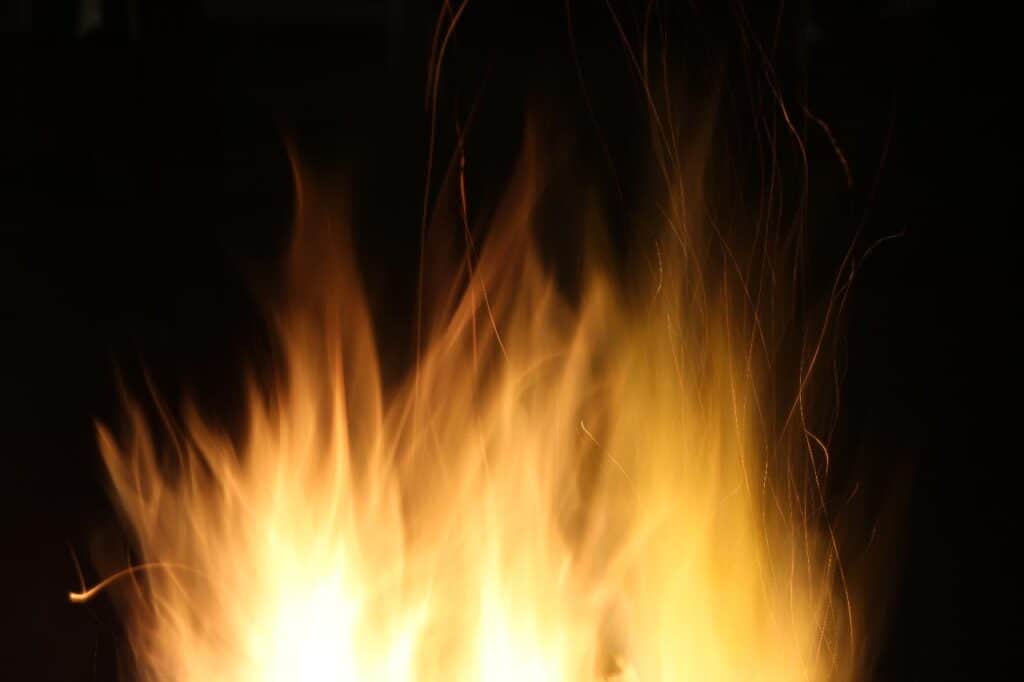Resin is a big term. While, most commonly, it refers to epoxy resin, which can be used to bond wood tightly and with a water-resistant seal, it may also refer to polyester resin or casting resin. These resins are made from a different chemical formula and it’s important to know which resin you are using before you look into their flammability.
One of the two parts of epoxy resin is flammable before curing, the other is not. Cured epoxy resin is not flammable and is actually fire-resistant. Polyester resin, pre-curing, is always flammable and has a very low flashpoint if it contains only styrene monomers. Casting resin is also flammable.
Since there are at least a few types of resin, let’s take a closer look at the fire hazards associated with each type of resin. Check it out.
Your # 1 priority is keeping your family safe. As a firefighter, I recommend everyone has updated smoke detectors that don’t require battery changes, like these ones from Kidde, a fire extinguisher, like this one from Amerex, and a fire escape ladder if you have bedrooms above the first floor, I recommend this one from Hausse.
Also read: What Makes Something Flammable?
Does Resin Catch Fire?

Polyester resin has a low flashpoint and can catch fire fairly easily. Epoxy resin can also catch fire, but requires a higher temperature to do so.
Epoxy resin requires careful handling but, in general, people who use it know to work outdoors or in a very well-ventilated space and to mix the two reagents away from any naked flames.
Now, epoxy resin will “smoke” sometimes when it’s curing. This is because the two parts of the resin react in an exothermic manner (they release heat) and when there’s too much of each part present this can release a lot of heat.
However, smoking epoxy resin doesn’t cause the resin to catch fire.
It is theoretically possible for you to use so much epoxy that the wood that you’re gluing would catch fire, but we can’t see that happening in practice, mainly because epoxy is not cheap – you’d need a huge amount of epoxy resin curing in the same place to hit the auto-ignition temperature of wood.
The auto-ignition temperature of curing epoxy resin is rather higher than that of wood.
Polyester resin, on the other hand, has a flash point of just 35 degrees Celsius or 86 degrees Fahrenheit.
This is much, much more flammable than epoxy and it means that on a warm day – the flashpoint is easily achieved, and any spark or flame could trigger a polyester resin fire.
This means that you need to take special precautions when working with polyester resins.
You should always wear the proper respiratory protection to prevent you from inhaling the fumes (which are also somewhat toxic, as well as flammable) and you should be using a liquid (water) spray to cool the containers with the resin in.
This reduces the chance of vapor pressure build up in the containers and, hopefully, prevents any form of auto-ignition or explosion.
As you might expect, you never work with polyester resin around anything with an open flame or any kind of electrical equipment that might spark.
This video shows a demonstration of the flammability of polyester resin:
Also read: Is Epoxy Flammable? Yes and No…
What About Casting Resin?
Casting resin is a polyester resin and yes, it’s very flammable and all the precautions that we’ve just outlined must be taken when working with it.
There are very few materials that you will work with that are as easy to catch fire as casting resin is.
Is It Flammable When Dry?
Epoxy resin is not flammable when it has been fully cured.
In fact, it is to some extent fire-resistant at this point. However, as with nearly everything, if you make it hot enough, then you can get it to burn. But with an ignition point of around 1,000 degrees Fahrenheit or higher – the wood that it has been bonded to will be on fire long before the epoxy will.
We don’t tend to describe resin as “dry”, but rather as “cured”, which means that it has undergone the complete reaction from the beginning product or products to the end product.
Polyester resin is a bit more complex.
It isn’t flammable when it has been cured, but it is more combustible than epoxy resin with a lower ignition temperature. It’s also worth noting at this point that not only does it burn more easily, but the fumes from burning polyester resin are highly toxic – you don’t want to breathe them in.
Flammable When Wet?
Epoxy resin is not flammable when wet. Polyester resin is highly flammable when wet, particularly if it is being cured with acetone.
Acetone is highly flammable, and an acetone fire is very likely unless you are taking full safety precautions.
Can Epoxy Resin Explode?
The precursor chemical (not the curing agent) for epoxy resin could, in theory, explode.
The bottle would need to be leaking and fumes would need to build up in a poorly ventilated space. Then if they were ignited, they could explode.
This video takes a look at the flammability and explosion potential of epoxy resin:
At What Temperature Does It Melt?
Epoxy resin melts at 150-600 degrees Fahrenheit, depending on the resin used, and it becomes soft at about 30-50 degrees before this point.
Melting epoxy or burning it while you work with it can cause bubbles or cracking in the finished cured epoxy that weakens it.
Polyester resin melts at 140 degrees Fahrenheit and becomes significantly weaker as it melts, it may also release toxic fumes.
What About Art Resin?
Art resin is a form of epoxy resin and as such, it can be flammable before it has been mixed (though the curing agent will not be). But once mixed and after curing, it will not be flammable.
UV Resin?
UV resin is a form of resin that cures in sunlight using the UV light to drive the curing reaction. It is not flammable and it is not toxic.
Related Articles
Is Wax Flammable? You May Be Surprised…

